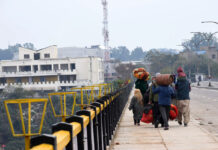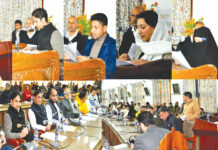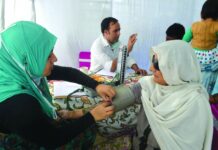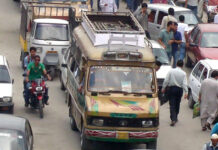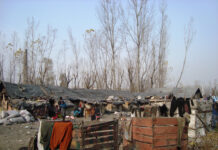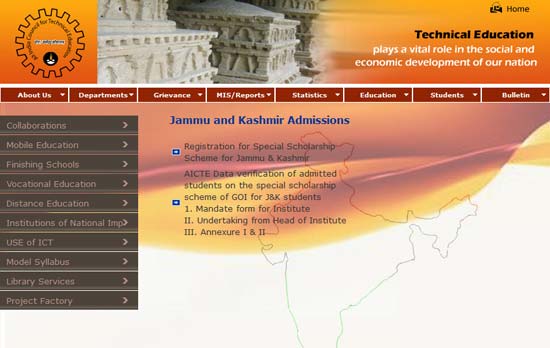Shuttling the capital between Srinagar and Jammu is an old tradition and expensive too. Doing away with the practice will hit state’s unity. But reversing the order – keeping it in Srinagar for winter and moving it to Jammu in summer – can make it relevant to the requirements of the people, a Kashmir Life analysis.
Drains are being cleaned, zebra crossings are being painted and traffic jams are back on Srinagar’s all-time narrower, dug up roads. These are visible signs of J&K getting ruled from Srinagar – the fourth dirtiest city in India – for around 24 weeks.
By now, darbar is a week old in Srinagar and the traditional cold wars among officials in the secretariat are over. They have already dusted the files and the ultimate shop of governance is fully set up. A cabinet meeting has already taken place and reiterations that everything in the coalition is hanky-dory have already taken place.
Every time caravans leave with overloads of files, comforts and hardware to the other capital, a debate is triggered over the wisdom of the practice that Dogra monarch Ranbir Singh started in 1833 fearing a revolt against his exploitative rule in Kashmir. There are talks about the practice’s uselessness and the bill that state has to foot.
Ministers and lawmakers apart, J&K’s secretariat is run by 7600 employees – 800 gazetted, 5500 non-gazetted and 1300 peons – who are at the helm in 41 departments that move in full and 45 others that move in part. In the latter case the move is permitted to ten officials or 33 percent of the total staff of a particular department.
By now, darbar is a week old in Srinagar and the traditional cold wars among officials in the secretariat are over. They have already dusted the files and the ultimate shop of governance is fully set up. A cabinet meeting has already taken place and reiterations that everything in the coalition is hanky-dory have already taken place.
Every time caravans leave with overloads of files, comforts and hardware to the other capital, a debate is triggered over the wisdom of the practice that Dogra monarch Ranbir Singh started in 1833 fearing a revolt against his exploitative rule in Kashmir. There are talks about the practice’s uselessness and the bill that state has to foot.
Ministers and lawmakers apart, J&K’s secretariat is run by 7600 employees – 800 gazetted, 5500 non-gazetted and 1300 peons – who are at the helm in 41 departments that move in full and 45 others that move in part. In the latter case the move is permitted to ten officials or 33 percent of the total staff of a particular department.
 The caravan is supposed to work for the people but for many weeks, it is the rest of the system that works for the darbar.
The caravan is supposed to work for the people but for many weeks, it is the rest of the system that works for the darbar. “Accommodation is a major issue,” explains a senior officer. “Unlike Jammu where we have 3600 flats there are only around 1100 in Srinagar and the security situation makes it mandatory for us to offer secured accommodations.”
This summer the government will be paying for the accommodation of 2326 employees for which the estates department has already taken on rent 104 hotels and guest houses offering over 2000 rooms of which around 300 rooms will be for the use of police. This is besides the accommodation already available with the government outside the estates department. For instance all the 55 commissioners and secretaries will stay in huts around Cheshma Shahi, a TDC estate that can earn fortunes otherwise. Some of the gazetted officers will be housed in TRC and Lala Rukh.
“It should entail an expenditure of over Rs 30 crore including the expenditure we will book for over 150 bedrooms which we require in Jammu during winter,” an officer said. Putting up in hotels means state pays for their food as well.
In the two decades of militancy the civil secretariat was attacked twice. But there is no instance in which a secretariat employee especially a non-Kashmiri was attacked. At one stage of turmoil, caging employees in hotels might have been a requirement dictated by the situation but it does not seem so any longer.
“Every year I come, I see a different button for the bell attached to my table with fresh wires,” a personal assistant of a senior minister said. “The moment, we leave, the switches are plucked along with the wires, and new ones are installed.”
It is not only about door bells. There are around 500 telephones in the civil secretariat and other departments that move fully or partially. They function for six months and remain disconnected for the rest of the year. It is true with Jammu as well. But for each phone, the departments pay the bill for the year and once these are reactivated nominal fee are levied. Right now when the telephone operators are ready to compete with each other, the government does not seem to be interested in getting a good deal.
“I have no details about the breakage of the computers, copies or other stuff that we move in and out,” a senior officer said. “But I am sure this is happening and all the departments spend a good amount on minor repairs.”
These costs are being borne by the system to see the state being governed properly and services delivered in time and professionally. But where is the time for that? As the employees get 10 days paid holiday for moving from one capital to another, twice a year (plus a cash compensation of Rs 5000 per head), it reduces the effective number of days to 345. They work five days a week so they get 100 days off as well. Around 30-40 days are devoured either by holidays or by strikes which reduces the number of working days to around 200, with 100 each in Jammu and Srinagar. If the days that the secretariat employees usually spend in closing the files and later reopening them are counted, it reduces the working days by a fortnight more.
If governance is the issue, then these are some of the factors that make sustaining this tradition a very expensive exercise. However, doing away with the move may not be an idea worth consideration. So what is the way out?
IT could be of help. J&K started creating a strong IT platform for e-governance in 1998. In 2002 it became a full-fledged department and B R Singh, the principal secretary to the then Chief Minister Dr Farooq Abdullah was keen to see the system taking over the traditional file system. Trainings were imparted on war footing. Later, an agreement was signed with the Tata Consultancy Service (TCS) that gave J&K the Secretariat Knowledge Information and Management System (SKIMS). Costs incurred so far are over Rs 10 crores. There were problems in the SKIMS +++ as only 274 of the 430 applications were found worth the use in J&K and of them only 18 were flagged for implementation. Officials were against the idea from day one as the system was transparent and there was no room for delay. As the top supervisors fled, the project fell flat.
But there is urgent requirement of the project to be revived. If all our files are getting loaded on the SKIMS and digitization takes over as a standard practice, arranging over 150 trucks for ferrying files can be done away with. Officials can fly to Jammu, open their computers and start working. No time loss and no file will go missing.
Durbar move continues to be anti-people and autocratic. Offices move to Srinagar as the temperature goes up in Jammu. They flee Srinagar when the winter sets in. Democratically elected government leaving its people to suffer the worst of weather makes it an anti-people tradition which must get reversed – offices should operate from Srinagar in winter and from Jammu in summer. Moving offices to Srinagar in summer adds to the problems – the roads get choked as traffic peaks, pressure on hotels reduces effective room capacity for tourism, additional security issues crop up. In winters this all will be available at very cheap rates. Is anybody listening?


